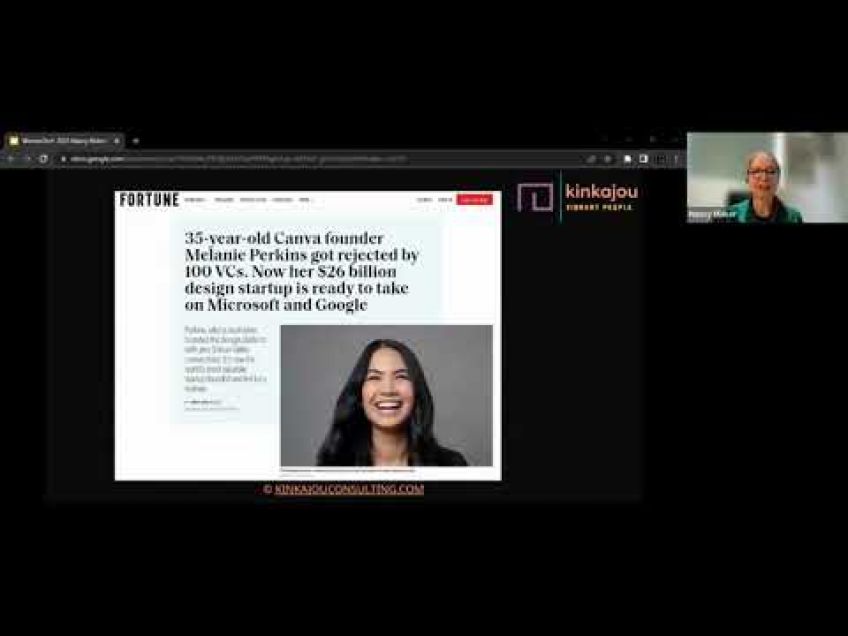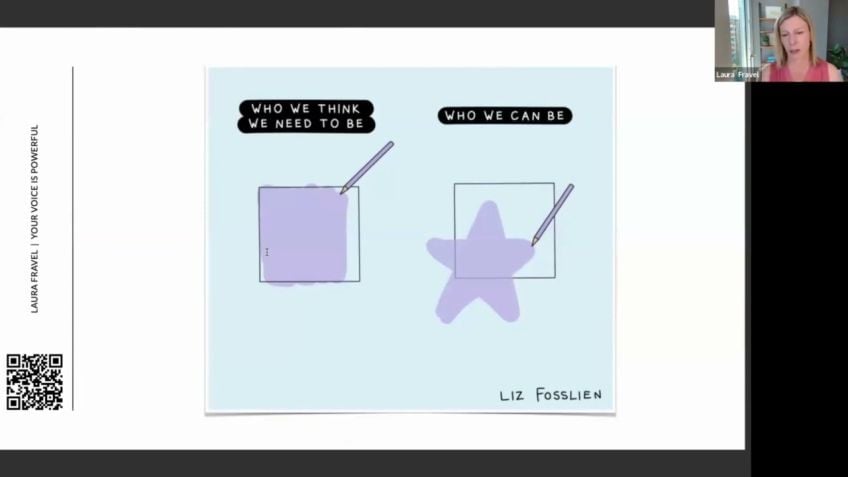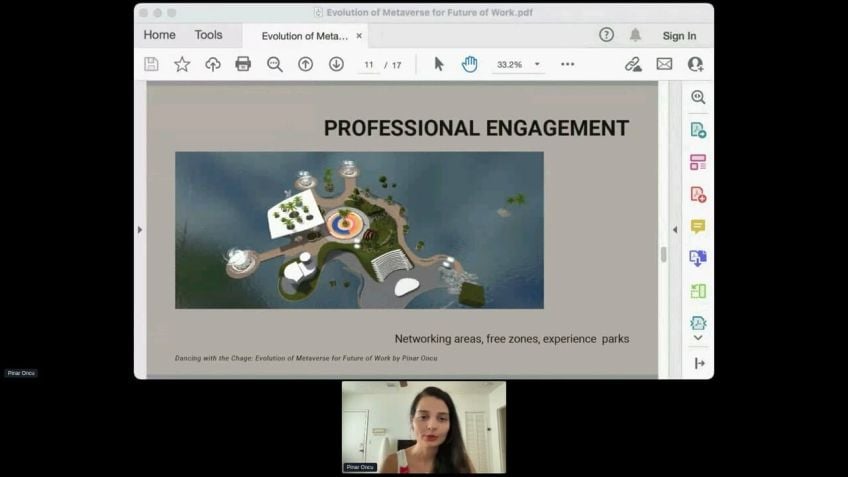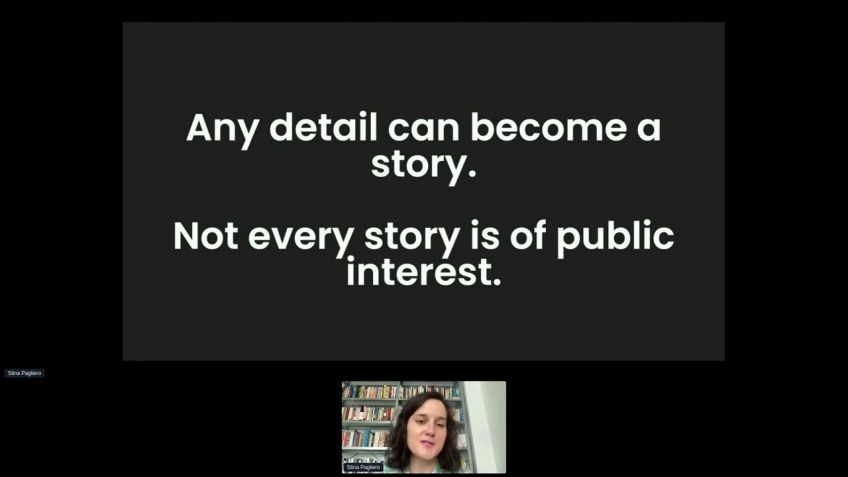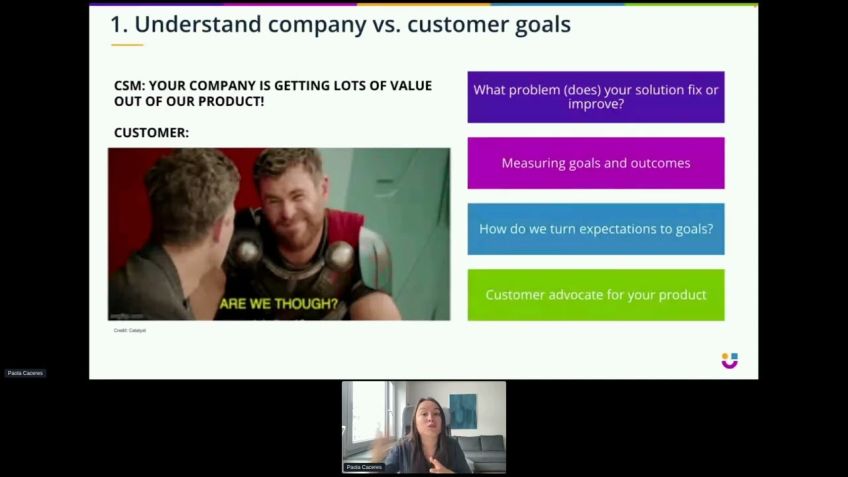How Storytelling Accelerates Careers by Connie Kwan
How Storytelling Accelerates Careers: The Six Storyteller System Explained
The power of a compelling story isn't limited to our favorite books or movies. It can also be an essential tool in accelerating our career growth. In this blog post, we'll explore the insights shared by Connie Kwan, CEO at Product Maestro and a seasoned professional with a unique knack for storytelling in the corporate world.
About Connie Kwan
Connie Kwan is not just a CEO but also part of the top 10 talent network. She brings a diverse set of experiences from her early days at Microsoft and Atlassian to accelerating seed to Series A startups as their fractional Chief Product Officer. With a technical background, Connie specializes in helping deeply technical projects compellingly convey their narratives to customers and investors. Let's dive into her insights on how storytelling accelerates careers.
The Journey to Becoming a Storyteller
In tracing her journey to becoming a proficient storyteller, Connie emphasized on her struggles with having her ideas heard in her early career. Despite carving out a successful career path that took her from major tech companies to startups and independent consulting, she struggled with storytelling.
Her realizations on the importance of storytelling were sort of stepping stones. It all began in her first job where she was tasked with creating PowerPoint presentations to pitch products. Business school further exposed her to the impact of incorporating emotional aspects into her stories. Finally, with her startup, she realized that who she was and what she represented played a crucial role in framing her narratives. These experiences laid the groundwork for her future success as a storyteller.
The Power of Storytelling
Connie shed light on a scenario common to many in the corporate world. She pointed out that presenting the same pitch to two different individuals may not yield identical reactions, emphasizing the importance of understanding your audience and using storytelling to create a connection with them.
Scientific studies have corroborated the power of storytelling. For instance, a 2010 brain scan study at Princeton University showed that the brains of story listeners almost completely matched with the story teller's brain, indicating a deep level of connection and understanding. This power of storytelling is a significant asset in the business world, especially when consistently conveyed across different contexts and audiences.
The Six Storyteller Type System
According to Connie, there are six main types of storytellers:
- Evangelist - They're highly enthusiastic and full of passion.
- Sage - They are empathetic and full of wisdom.
- Wise Neighbor - They're approachable and command a level of respect.
- Visionary - Known for their ability to inspire with powerful visions.
- Truth Teller - They call things as they are, often with humor.
- Professor- They're deeply knowledgeable, analytical, and insightful.
Each storyteller type dictates how one communicates and pitches ideas, and it's important to be able to connect with audiences of all types. Building upon this conceptual understanding, she offers a special course to help others master their storytelling skills and accelerate their careers.
In conclusion, storytelling is a critical skill to master for anyone looking to excel in their careers. By understanding your audience and adjusting your narrative style to suit them, you can achieve effectiveness in communication and persuasion. And while it may be challenging, the rewards are certainly worth the effort.
Video Transcription
Connie Kwan is up next. She is the CEO at Product Maestro and as well, she is a talent in the top 10 network where I happen to be the director of community.So I'm really pleased that we have her here on stage today as we do have this connection in our work life too. But Connie has a very exciting career path. She's accelerated seed to series a start ups in B to B as their fractional chief product officer. She is an ex Atlassian and ex Microsoft with a technical background. We saw a head of Microsoft earlier today, she specializes in deeply technical projects that have a harder time telling their stories to customers and investors. And so one thing that Connie is really focused on is kind of being a sounding board for all things. Fundraising, go to market and product and really on how to tell your story. So right now she's gonna on the stage and has a session for us about how storytelling accelerates careers. And so she's got a six storyteller system and many ways to help you use your strengths and advance your skills and career. So without further ado Connie. Welcome to the stage.
Hi, everybody. Excited to meet you today. Thanks for having me. Thanks for hosting Margo.
Yes, absolutely. I'll hand it right over to you.
Awesome. Uh So how storytelling accelerates career? I want to share my story about how I became a storyteller over a long career. But I didn't get here very easily because I started in a very different place. And if you struggled with having your ideas heard, then know that you're not alone because I struggled with this as well. For over 12 years before I started figuring it out right now, I'm quite happy with my career. Um worked in some large companies like as in Microsoft Product for a long time. And then the chief product officer worked for smaller companies. And now I consult independently with a lot of companies as well as teaching a storyteller class, storytelling class to professionals.
So I'm quite happy with where I landed, but it was definitely a very uh roller coaster ride in many ways. And what it took me a long time to kind of get to this point. And one thing that really struggled in particular was storytelling because my journey started in engineering. I went to University of Wu in Canada for engineering, for computer and electrical engineering. And you can see here my pictures from my final project on the left uh which was an led light uh before led s are kind of everywhere now. But this was a long time ago and the Canadian government loved our project so much that they flew the whole project team to Ottawa and it gave us an award that was on the bottom right here. Um For innovation. Um We didn't end up taking this product to market, but we learned a lot. I learned a lot from waterloo engineering. Um One thing that I did not learn though, that ended up being very pivotal in my career was storytelling. And I stumbled over a lot of stones, some of which were stepping stones, most of which were more tripping stones to get to this point where I understood the value of the storytelling.
Um And then having ways to approach it, that made sense because in engineering, what they teach you is OK, you put the facts together and then you explain it to the next engineer next to you and they're convinced because they look at the facts and they look at your charts and say, yeah, that's how it works.
I agree with you. So I thought that's how everything works, but that's not how anything worked. And when I was doing product management work, which means convincing executives and sales and engineering and marketing and customer, everybody, everybody had a different perspective and it was a very different world.
So how do I make this journey from where I was here to where I am now? The first stepping stone was actually my first job at Cyprus. Um I was the product marketing engineer there. And what that meant was instead of hiring sales people and then training them on the engineering piece. They hired engineers and trained them on the sales piece. So they had professional sales people um like in on location with the customers. So say in Germany with Siemens, they would open up the door so they will know, ok, we need to meet these engineers and then they would fly me over there to close the deal to explain how the product works, talk engineer to engineer and explain it. And then they would be like, OK, cool. And then the salesperson would close the deal. So really cool. What I learned was I was asked to make powerpoints. Whenever new products came out, I had to put together the powerpoint um go field test it with other product marketing engineers in my group and then go field tested in the field. So my first stepping stone was learning the basics of how to pitch a product, right? How to pitch a product to an engineering audience. Now, fast forward five years and two jobs later, I encountered my second stepping stone in storytelling which was at my business school, uh presidio graduate school.
And this, I call this an MB A in tree hugging because this is unlike any other business school. Um The mission the school started by uh a founder called Hunter Lovins and she's a huge name in the sustainability space, in the climate and sustainability space. And the school has started to motivate businesses that had three PS in mind, not just profit, which is the first piece and every business needs to care about that. Um But also people and planet. So you can imagine this business school attracted a very different crowd. And half my student, fellow students are uh from a nonprofit background um which is very interesting because when we were giving presentations, you know, you do that a lot in business school. Um they did very different presentations. You know, I'm used to slides that are 50% text and 50% image and graphs or, you know, diagrams, stuff like that, sometimes up to 80% text. But I was stepping into rooms where they were, these students were presenting stuff that was like 100% images. It was like they're showing their photo album, but they were telling these amazing stories, right? And I was really drawn and I was really convinced. So this was my second stepping stone is learning the power of using emotions in my stories. Fast forward two more years, I'm on my third stepping stone. Now, I had my own start up at this point and we were helping people eat better um using an app and I was selling to, you know, the likes of Blue Shield and large enterprises.
Uh I was invited to an investor meeting in San Francisco where I was pitching to a whole room of angels. And my pitch, there was no slides. You just have a mic. You go up there and you talk for five minutes. My pitch completely bombed, completely bombed. Everybody drilled me on. How are you going to get to market? How are you going to sell to these enterprises? You have no experience in sales, et cetera, et cetera, et cetera. They were skeptical from the start. I mean, you have to remember that this today, four only 4% of venture capital and angel investment go to female founders. That's today 4%. This was 10 years ago. So you can imagine the tough crowd that I was facing. I had no idea. This is my third stepping stone is understanding that who I am and what I represent was a huge factor in the story that I was telling and this is all great in retrospect, I had no idea at the time really that these stepping stones, these three stepping stones was really important in shaping my career in product in product management and be becoming a much better storyteller in this role.
So here's a typical scenario that you probably encountered as well in your role. Um If you interface with anybody outside your department at all, around 10 years ago, I was a PM at a software company and I had a new roadmap idea, a new direction, a new product, a new um kind of f sub feature really for a product that I wanted to pursue. So I pitched that idea to Joe, who's the head of engineering and my partner. And he was like, oh, my goodness, this is so great, Connie, let's do this. Um I would totally be on your team to do this if you can get this, basically thumbs up with um the rest of the executive crowd. I was like, ok, great. I have the most important person that I need to build it and he's totally on board. So I took that pitch and I flipped it around and I pitched it to, to Mike, who's the CEO same pitch successful with Joe Complete thumbs down with Mike. Has this happened to you? If this happens, you drop a Yes, I bet it's at least happened to 80% of you, right?
Exact same pitch, different crowd and didn't work if it's happened to you, please share because I think it's so important for all of us to recognize that it's a really tough problem, right? Pitching to somebody and getting that pitch right? It changes with each person. So how do you get it right? Every time with different people, put your name, your role. Um I guess your name is already on there when you write it, your role. Um, like who did you pitch to? And that one thumbs up, who did you pitch to? One thumbs down? You know, for me it's pitched my road map for Q three. Joe said, yes, my son. No. Right. Share that in the chat because I think everybody would like to know that they're not alone in this. So let's look at what happened. What happened here? What happened is that I'm over here with Joe. I work with Joe every day. I know what he cares about. I speak Joe's language and there are two important things that I really know about Joe. One is that I know exactly what I need to say, like the content, right? And then I know how to say it. So that Joe would be convinced, I didn't consciously know this but just working with him so much. I just know this. But with Mike, I didn't have this knowledge at all. He's in completely different meetings. He cares about different things. So I failed to connect with him. And then the other thing I realized is that with Joe because he's in my contacts all day long. Um Oh, what happens?
There is a slide fail. OK. Let me reach out my slide. Hold on. It. Went to sleep. Present, slide presentation screen. OK. We're back, we're back. Thank you. All right. We are already down here. But Mike, I didn't know either of those things, right? So I didn't connect with him and what I needed was a bridge so that I can better connect with Mike and that bridges stories. OK? With Joe. What I was doing was actually giving him a set of facts and because Joe was in my contacts and understood what I, what I was getting to and he's an engineer. He's like, yeah, I believe in your facts and I think we should move forward. But with Mike, I needed to package all that information and turn it into a story that really connected with him. That's the piece that I was missing. And storytelling is so powerful because it's actually a mind melt technology. And they have done scientific studies about this.
In 2010, Princeton University Psychologist Yuri Hansen did an MRI study. He put his graduate student, Lauren into an MRI which scans your brain and he had her tell a 15 minutes story about her high school days. So Lauren talked about how two boys were fighting over her to take her to prom. And she talked about having a car accident once and the police officer came over and she had an encounter with him. So she just talked about stories right in her life and they captured her brain scan, they captured the story audio, then they put 11 more students into the MRI machine separately uh play the audio back and scan their brains. And the amazing thing they discovered was that the brain scans almost completely matched as the person listening to Lauren's story. Um was I listening to the story? He was or she was imagining the same scenario and basically having the same feeling and emotions as Lauren um in that moment. So that's super powerful to know and super powerful, right? Because, you know, if we can turn our information into a story, then you have a strong chance of connecting really deeply with another person. So the question is then how do you do this on a consistent basis?
Because, you know, in the business world, like I'm telling five stories a day, right? Like I'm pitching to engineering, I'm pitching to sales. I'm pitching to execs, like that's a lot of stories. And if you spent, you know, 20 minutes on each one crafting it, that's not, not enough time. So there's a system that I created called the six storyteller type system, which I want to share with you because I think this is a really important stepping stone in your career is to understand that the value of storytelling and then how to consistently do it well. Um there are two aspects to storytelling, right? Just the drafting of the story and then there's also the delivery of the story and, and both of those are covered in the six stories framework. So this six stories framework is an amalgamation of my own experience in product management.
But also I worked with a, an actor, a professional actor and created the system because he came at it from the, you know, for like the Hollywood storytelling lens, right? The, you know, how do you craft story, the very artsy kind of story, crafting. And I came from it from a very business orientation. And we created the system um that basically uh allowed you to find out which of six storyteller types you are. Because there are six different storyteller types and they're spread across an emotional spectrum. And as humans, we're all born storytellers. So what that means is if you can connect to the other, well, you're one of them. So if you can connect to the other five really well, if you can change the story, how you package your story and the way you deliver it so that you can adapt to each of the five that come up in your life, then you suddenly become a very powerful storyteller and a very powerful influencer because you can adapt to what the other person needs.
That's a storyteller. So let's find out which of six storyteller types you are. I want you to drop into this link here. Um The quiz is free uh just take a minute and um answer the eight or so questions in there. Uh At the end, you can scroll back up in order to see for some of the browsers, you need to scroll back up to see the the final answer. Um You also will get an email that has details. So the answer on the screen will just be the type one of six. and then you'll get an email as Well, that gives you detail like a long block of text about what that type means. So I'm gonna pause for a minute and let you have a chance to fill out this quiz. And for those of you ahead, you can um fill out the poll as well. Once you finish the quiz, you can fill out the poll, I'll click on the poll so we can see who else is in the room because that's always fun, but definitely fill out the quiz. Ok, great. We only have four minutes left. So I'm gonna keep going here. Um Just make sure you type this or scan this at this point and then you can finish as you go. So one of the six storyteller types, ok? These are the six, it goes from the very, very emotional evangelists, right?
Like they're very big, very larger than life like the Tony Robbins, they get on stage. Oh my goodness. They have so much to share with you. They're very excited to be much more emotional but also emotional, but much more metered sage, right? The sage is um connecting with you. The sage is very empathetic to you. Like the sage is Oprah, you know, listening to you and drawing out your story and really being a part of your journey, that's the stage, a lot of wisdom there. Then you have wise neighbors who are just emotional too. They started emotional, but they're very friendly, they're called wise neighbor because there's someone that you can really connect to, you see them just hanging out on the lawn and you're like, hey, how's it going, neighbor?
They're like, yeah, good stuff. But they're just, they know a little bit more and you respect them for that. Um, but they're very approachable type of people. Then you have the visionaries, right? The visionaries, like you're Steve Jobs and they get on stage and they start with a big number on the, on the slides and you're like, what's that big number about? And he tells you, oh, that big number, that's how many people we saved this month. And then you're like, well, what's that about? So he hooks you in with some of the logic, but also blends it with the emotion to create this, this almost theatrical experience, right? To really build that vision and help you be a part of that vision. So that's your visionary, these, these, these leaders, these storytellers that can really draw you in with that vision and you have a truth teller. Someone who's like really calls it out, calls it like it is, there's elephant in the room. There it is. Let's talk about that, but they're funny, they're funny. And so you listen to them because they know how to wrap that in humor. And then finally you have your professor, right? Someone that uh like Ruth Bader Ginsburg or Neil Degrasse Tyson, someone is very um interested in a topic and very knowledgeable in a topic.
Um, and just, you know, you would, you would be very excited to learn from this person because of all the experiences that they bring, um, and the authority that they have, but they're very logical people and so approaching that personality is a specific thing as well. So, these are the six, right? These are the six. And then the question is, which one are you? And then how do you flex yourself to connect with all the other folks? Um I'm gonna check the chat to make sure. OK, we're good here. Just let me know if we're running out of time. I'm almost done. Um oh pull on results. I was just gonna show that I don't know if you can see, oh, you probably can't see my screen but we have, yeah, mostly wise neighbor. A number of half the people are either a wise neighbor. I'm just going to tell you because I can't move it over half the people, wise neighbor, like 20% are visionary and then um 20% are evangelists actually in this room and then 19% truth teller. Um And then professor is actually a small chunk here. So very interesting. We have a lot of wise neighbors and visionaries in the room, right? And that's great news because if you're in the middle of the spectrum, it's easier for you to stretch to the ends. Um And if you're the ends like if you're a professor or evangelist, then going all the way to the other end is challenging, right? But then you're really good at, you know, pulling the emotion or you're really good at pulling on the, the logic.
So everybody has their advantage, right? You're really good at connecting with people in the same type as you. But the challenge of course is to be able to flex into the other, into the others. So, um I don't know if I have time moderators to do a quick demo. It was gonna take another minute of how the six types are in action, but I kind of demoed it when I explain it's time to wrap up. All right. So I'll go ahead and wrap up. Um This was gonna be a demo of me doing all six but um with the different personalities, but you kind of saw me doing that earlier and what I would wanna just wrap with is that, you know, we learn a couple of things, we learn that there are six different types of storytellers.
You need to connect with your audience by matching your type to theirs. Um And that storytelling is such an important tool, important stepping stone in your career. So take time to learn it, like take time to, to take a class, invest in it, you know, have people give you feedback because if that's what they say, when you need soft skills to get into management that's what that is. So I encourage you to do that. And if you learn something today, please share it in the chat. Um, I want to give you an offer which is for my class starting in January 12th. I want all the women in tech to get really good at storytelling. And so I want to give you a 20% off if you attend it today. Um That's the code. So if you're interested, check out the class and once you apply, you can use that code to check out and get the, get the offer because I think it's so important, especially for women, especially for minorities in tech. Thank
you so much. That's very kind of you. And we are gonna wrap here today because we are just over time. But thank you for your energy that you brought to the stage today. Um I think all those different types are really interesting in that. I'm gonna have to take your survey right away too, but I was keenly listening to you today. Um So we'll touch base and we'll share what kind I am. Certainly there is high energy in there. Thank you for joining us today. Connie.
Awesome. Thank you.

